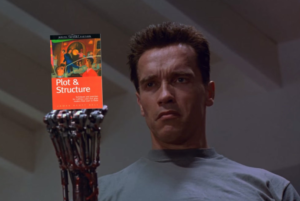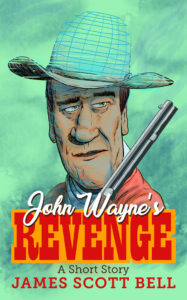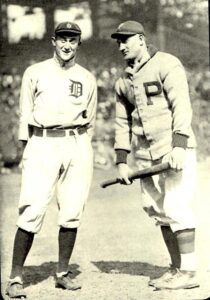by James Scott Bell
@jamesscottbell
I got an email last week which I post here with the sender’s permission.
Dear Mr. Bell,
I’ve been reflecting on something I thought you might find intriguing, given your strong defense of flexible structure in storytelling and your view that both plotters and pantsers benefit from it.
I’ve come to think of it as The Paradox of Spontaneity:
Spontaneity feels wondrous because it bypasses conscious control. But it’s only possible because of preexisting order.
The metaphor that struck me is lightning. Rather than being random, it’s the sudden visible manifestation of a vast, invisible system of order, aka, the atmosphere.
It even goes a step further with what’s called the Schumann resonances, which describe how all lightning strikes worldwide combine to maintain a fairly steady “heartbeat” of the planet. Old-fashioned car antennas pick up on this. Watch closely, and they’re always vibrating, tuning in to this heartbeat like an AM/FM stethoscope.
The Earth and the ionosphere form a gigantic spherical resonant cavity, like the body of a guitar. Every year, roughly 1.5 billion lightning strikes excite this cavity, forming low-frequency electromagnetic waves. These waves settle at specific resonant frequencies, mostly around 7.83 Hz. Isn’t it amazing how so many “random” lightning strikes both originate from and sustain order?
And yet, people often say structure steals the heart of stories! They forget that even hearts must beat to an orderly drum, or they wouldn’t be alive.
It’s like we crave the romantic idea of “the pure waters of creativity” so much that we forget: without structure, you don’t even have water yet. Reminds me of a neat, little orderly formula called H₂O.
Since you’ve written so persuasively about structure as a friend, not a foe, to creativity, I thought you might appreciate the connection.
What a brilliant insight! Our world vibrates with a great cosmic heartbeat. It sends us signals, bursts, and we experience them as spontaneity. It is not chaos theory; it all comes from a connected web of structure and order, which is what holds everything together.
Imagine an Earth without gravity. We’d all be Starlink satellites. Gravity allows us to move around on the ground, to dance, to run for the end zone, to put our arms around each other and sing or pray or bring words of comfort.
All of this is wild and wonderful. Structure is beautiful.
Yet there seems to be a notion out there that a thing called “story” can exist apart from structure. That’s not possible. Heck, it’s not just impossible at the novel level; you can’t even write words, sentences or paragraphs without structure.
I write lehslitrr.
Oops, I mean thrillers.
As writers we all love to ride the lightning. Should we just wait for it to happen? Or are there ways to attract it? Let me suggest a few methods.
- The Bradbury landmine. Ray Bradbury’s brain was a lightning rod. It worked at night, sometimes in his dreams, but mostly at the subconscious level. When he woke up he’d record as quickly as possible anything that came to the surface—images, concepts, bits of a scene. Only later would he see what kind of structure was being offered.
- Outliners can use the “killer scene” method. One of the most enjoyable parts of my planning is sitting in a coffee house with a stack of index cards, writing down scene ideas which come to me in visual form. I don’t think about the outline at this point. I just ride the lightning. When I have 30 or 40 cards, I give it a day, shuffle the deck, and then start to assess what scenes I love and where they might fall in the story, or where they might be giving me new direction. With cards, it’s easy to move them around (which is why I like the corkboard view in Scrivener).
- Pantsers ride the lightning as they write, and do so right on through to a completed draft. Nothing at all wrong with that (it is simply a longer version of what outliners do in #2). At some point, though, structure and craft need to take a hand. I’ve read so many manuscripts (and more than a few books) by “discovery writers” that drag like a rusty anchor because they fail at the structural level.
- Ride when you’re not writing. You see an image, a billboard, a person crossing the street. Or you overhear a bit of conversation and find you imagination starts firing. Let it go.
(For ten more ways to “goose the muse,” see my TKZ post here.)
I was at a Starbucks once, looking out the window at the parking lot, when a scene from my WIP started playing on the movie screen of my mind. I have no idea how long I was like that, but at one point a man sitting in a chair across from me said, “Are you all right?”
“Huh?” I said.
“You weren’t moving,” he said.
“Ah,” I said. “I was working.”
“Working? What do you do?”
“I’m a writer.”
He looked at me with that expression of wonder and pity we sometimes get when we give that answer.
Thinking back, I wish I’d said, “I ride lightning.” He probably would have switched chairs.
What about you? Do you ride the lightning? When does it happen for you?








 “I’m completely library educated. I’ve never been to college. I went down to the library when I was in grade school in Waukegan, and in high school in Los Angeles, and spent long days every summer in the library… I discovered me in the library. I went to find me in the library. Before I fell in love with libraries, I was just a six-year-old boy. The library fueled all of my curiosities, from dinosaurs to ancient Egypt.” — Ray Bradbury
“I’m completely library educated. I’ve never been to college. I went down to the library when I was in grade school in Waukegan, and in high school in Los Angeles, and spent long days every summer in the library… I discovered me in the library. I went to find me in the library. Before I fell in love with libraries, I was just a six-year-old boy. The library fueled all of my curiosities, from dinosaurs to ancient Egypt.” — Ray Bradbury In his early years as a writer, Ray Bradbury made lists of nouns based on childhood memories. Things like: The Lake, The Night, The Crickets, The Ravine.
In his early years as a writer, Ray Bradbury made lists of nouns based on childhood memories. Things like: The Lake, The Night, The Crickets, The Ravine.